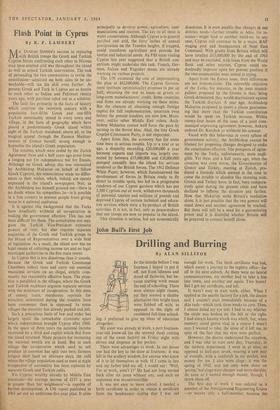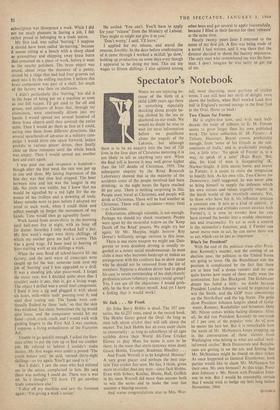John Bull's First Job
Drilling and Burring
By ALAN SILLITOE My sister was already at work, a pert fourteen- year-old know-all (as she seemed then) coming out of the sweet factory on Friday night with, eleven and sixpence in her pocket.
There were advantages to work. In our house one had the key to the door at fourteen: it was left in the scullery window, for anyone who knew of it to let themselves in with. If I came in late and my father told me off, I would say: 'Well, I'm at work, aren't IT' He had not long started back after six years without any, and such an argument was incontrovertible.
It was not easy to leave school. I needed a birth certificate in order to obtain a certificate from the headmaster stating that I was old
enough for work. The birth certificate was lost, which meant a journey to the registry office—far off in the next suburb. As there were no lateral communications, my mother had to take a bus into town, and another out again. Two buses! But I got my certificate, and left.
It wasn't easy to start work, either. When I applied at the nearby factory for a job, the doctor said I couldn't start immediately because of a skin rash—which took three weeks to cure. Then, I almost failed my eye test. I had to say whether the circle was broken on the left or the right. I had always known which was which, but, when memory could prove vital in a course I wasn't sure I wanted to take, the sense of it left me, in spite of the fact that my eyes were perfect.
However, the doctor understood the situation, and I was told to start next day, Thursday, in the turnery department. I went in at nine, as opposed to half-past seven, wearing a new pair of overalls, with a sandwich in my pocket, and money for tea. I also wore clogs: it was the spring of 1942, and not only were shoes on 'points,' but' clogs were cheaper and more durable. As soon as I earned enough money, though, I threw them off.
The first day at work I was enlisted as a member of the Amalgamated Engineering Union —or maybe only a half-member, because the
subscription was threepence a week. While I did not see much pleasure in having a job, I felt rather proud at belonging to a trade union.
My first task was called 'burring.' I suppose it should have been called 'de-burring,' because it meant sitting at a bench with a sharp chisel or screwdriver and chipping away brass burrs that remained on a piece of work, before it went to the nearby polishers. The brass object was round, about twice the diameter of a penny, circled by a ridge that had had four grooves cut deep into it by the milling machine. I believe this brass component was part of a shell, for much of the factory was then on shellcases.
I didn't particularly like 'burring,' but did it in the hope of being put on a machine as soon as one fell vacant. I'd got used to the oil and grease, and splinters of brass that, through my clumsiness, were continually driven into my hands. I would spread out several hundred of these brass objects until they covered the entire table. Then I would do them as fast as I could, eating into them from different directions, like several spearheads ,of advance in a military cam- paign. I would drive one space forward, isolate pockets in various pincer drives, then finally clear up these remnants until the whole bench was empty. Then I would spread out another box and start again.
I was paid one and twopence a hundred— though after the first week the rate was put up to one and three. My lasting impression of the first day was that time had stopped. The hour between nine and ten was the longest in my life. No clock was visible, but I knew that ten would be signalled by a red light for the en- trance of tea trolleys and a downing of tools. Many months were to pass before I adapted my mind to such work, when I could think and reflect enough to forget the movement of my hands. Time would then go agreeably faster.
Work lasted from seven-thirty in the morning until half-past five at night, with an hour off for dinner. Saturday I only worked half a day. My first week's wages were thirty shillings, of which my mother gave me half a crown. This was a good wage. I'd been used to hearing of boys starting work at ten shillings a week.
When the next flood' of school-leavers hit the factory, and the next wave of conscripts were caught up for the war, someone took over my job of 'burring' and I was upgraded to a drill. It was a standing job,• also piece-work. I forget the exact rate, but I decided quite soon that I couldn't make it pay, that is, get a living wage. The object I drilled was a small steel component. I fixed it into a jig and plugged it with about six holes, milk-white 'suds' pouring over it, and steel dust oozing out. The hands were con- tinually flushed by these 'suds,' so that the skin was wrinkled, but clean. Sometimes the jig would spin loose, and the component would hit my hand—crash, crash, crash, and I would walk with gushing fingers to the First Aid. I was careless, I suppose, a living embodiment of the Factories Act.
Unable to go quickly enough, I asked the fore- man either• to put the rate up or find me another job. He refused to believe I couldn't make money. My first wages were under a pound. 'The youth before you,' he said, 'earned thirty-eight shillings—so try again. You'll get used to it.'
But I didn't. I saw the man who had enlisted me in the union, complained to him. He said there was nothing 1 could do. There was a war on. So I thought: 'I'll leave. 1'11 get another trade somewhere else.'
I shut off my machine and saw the foreman again : 'I'm giving a week's notice.' He smiled. 'You can't. You'll have to apply for your "release" from the Ministry of Labour. They might or might not give it to you.'
'Don't worry,' I said, '111 leave.'
I applied for my release, and stated the reasons, forcibly. In the days before confirmation of it came through I worked a skilfull 'go slow,' holding up production on some days even though 1 appeared to be doing my best. This cut my wages to fifteen shillings. I also agitated among
other boys and got several to apply (successfully, because I filled in their forms) for their 'releases' at the same time.
Nearly twenty years later I returned to the scene of my first job. A film was being made of a novel I had written, and it was there that the director decided to shoot the factory sequences. The only man who remembered me was the fore- man. I don't imagine he was sorry to get rid of me.































 Previous page
Previous page